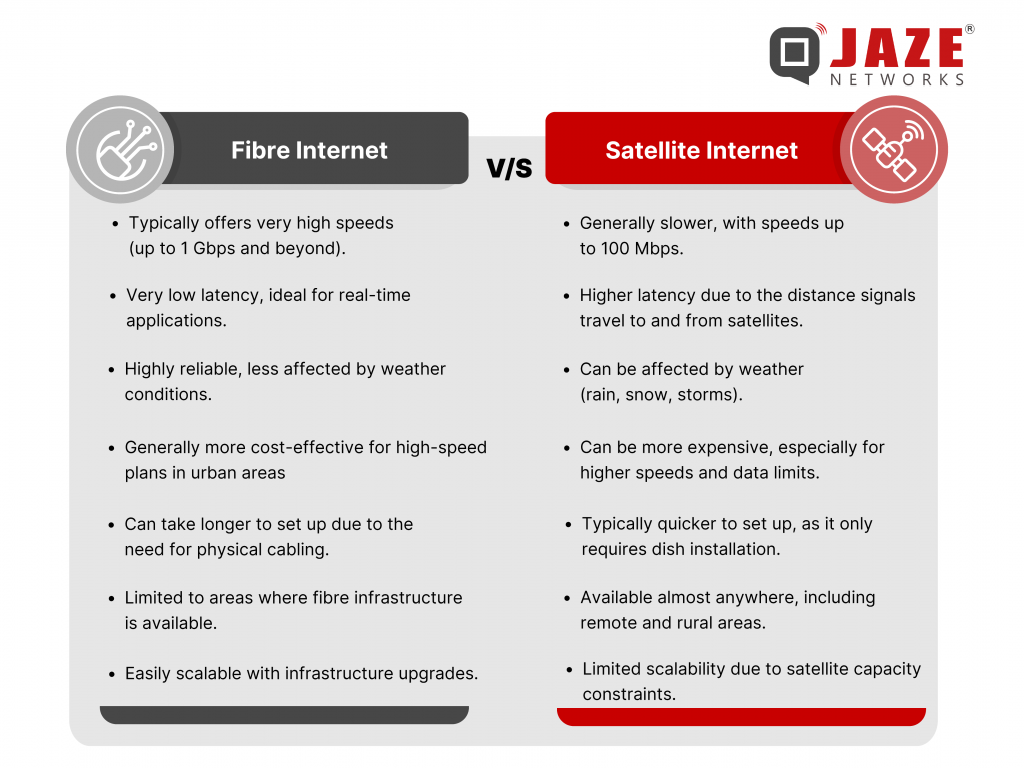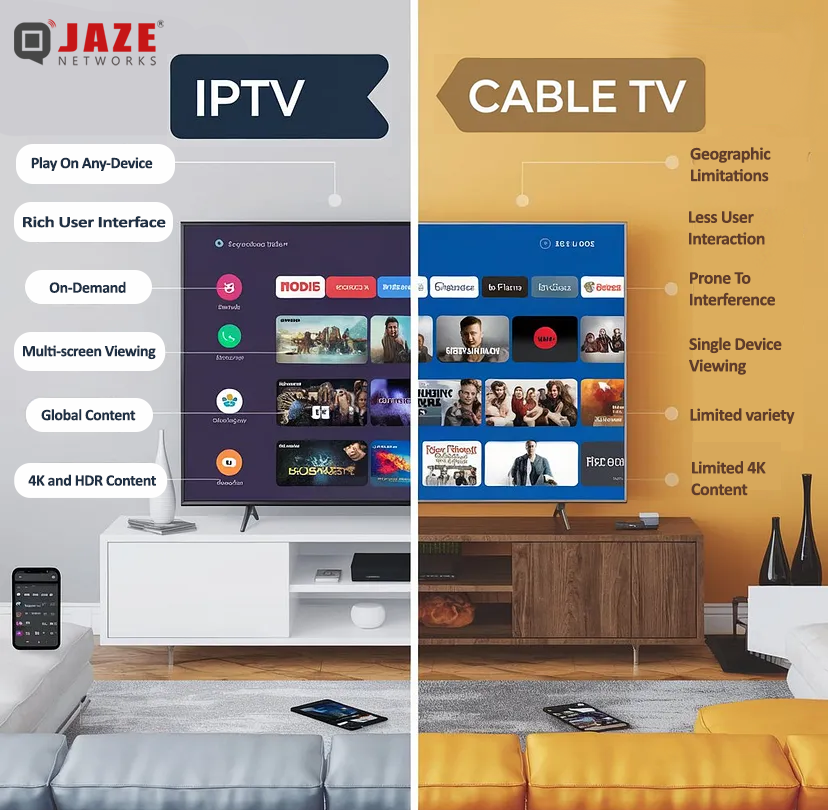




In today’s connected world, choosing the right internet service is crucial. With various options available, it can be challenging to determine which one best suits your needs. Two popular choices are fiber and satellite internet. Each has its unique advantages and disadvantages, making them suitable for different situations. Let’s dive into the details to help you make an informed decision.
Fibre internet, powered by fiber-optic cables, is known for its exceptional speed and reliability. Here’s a breakdown of its benefits and challenges:
Satellite internet, as the name suggests, relies on satellites to beam internet signals to users on the ground. While it doesn’t match the speed and reliability of fibre, it has its own advantages, especially in remote or underserved areas.

The choice between fibre and satellite internet depends largely on your location, usage needs, and budget.
Despite the growing market of Satellite Internet, fiber based Internet is here to stay. Fiber based ISPs are more reliable with faster speeds and lower latency which provide a better customer experience. ISPs need software to manage their business operations and automate processes.
Jaze ISP Manager integrates with all leading BNG providers to provide scalable and enterprise-grade AAA, BSS and IPDR solutions for ISPs of all sizes. Click here to learn more.
As the landscape of home entertainment evolves, the competition between IPTV (Internet Protocol Television) and traditional cable TV intensifies. With the growing trend of cord-cutting, viewers face a pivotal decision about which option aligns best with their viewing preferences and lifestyle. This guide examines the essential differences between IPTV and cable TV, empowering you to make an informed choice about your entertainment future.

Cable TV: The Traditional Approach
Cable TV has long been the dominant method for delivering television content. It relies on coaxial cables to transmit signals to your TV. This well-established technology provides some clear benefits:
Stability: Cable TV is reliable and less dependent on external factors like internet speed.
Quality: Picture and sound quality remain consistent without buffering issues.
However, cable TV does come with its limitations. It is geographically bound, meaning you need access to the provider’s physical network, and the channel selection is often bundled into large packages, which may include unwanted content.
IPTV: The Internet Revolution
IPTV is a modern alternative, utilizing your internet connection to stream content. It offers significant flexibility in terms of device compatibility, letting you watch on your TV, smartphone, or tablet. With IPTV, users enjoy:
Customization: Pick the channels or programs that interest you, instead of settling for bundled packages.
Global Access: View content from around the world, bypassing geographic limitations.
Cable TV: Bundled Services and Contracts
Cable TV providers often offer bundled services that include internet and phone packages. While this might seem cost-effective at first glance, hidden fees for equipment rentals or installation, along with long-term contracts, can make it more expensive in the long run.
IPTV: Flexible and Transparent Pricing
IPTV services usually have straightforward pricing models. With subscription-based plans, you can pay for just the content you want, without any long-term commitment. Additionally, there are no equipment rentals or hefty installation fees, which makes IPTV an attractive option for those seeking flexibility in budgeting.
Cable TV: Familiar Offerings
Cable TV provides access to a wide range of channels, including local programming and live sports. However, its content library is often restricted to what the provider offers within its region, limiting options for international or niche programming.
IPTV: A World of Content
One of IPTV’s major advantages is its vast library of on-demand content, spanning across different genres, languages, and countries. IPTV platforms allow you to explore international programming and tailor your viewing experience based on specific interests, whether it’s niche content or blockbuster movies.
Cable TV: Traditional Navigation
Cable TV interfaces are generally simple but dated. Users navigate through a traditional TV guide, and DVR options allow for recording shows. However, searching for specific content can be slow, and the interface is not designed for personalized recommendations.
IPTV: Modern and Intuitive
IPTV services often provide more user-friendly platforms. You can search for content quickly, receive personalized recommendations based on viewing history, and synchronize your watching experience across multiple devices. This modern convenience is a big win for users who want an effortless interface.
Cable TV: Consistent Performance
Cable TV offers stable picture quality, with many channels available in high definition (HD). However, 4K content is still rare in traditional cable packages, limiting options for viewers with ultra-high-definition TVs.
IPTV: Leading the Quality Race
IPTV is more advanced when it comes to high-quality content. Many services provide access to 4K resolution and HDR (High Dynamic Range) content. Additionally, IPTV platforms use adaptive streaming, adjusting picture quality based on your internet speed, ensuring a smooth viewing experience.
Cable TV: Stability Under All Conditions
One of the major advantages of cable TV is its reliability. It remains unaffected by internet outages, and performance is generally consistent. It’s less susceptible to external factors like weather, making it a dependable choice.
IPTV: Dependent on Internet Connectivity
IPTV services, however, depend entirely on your internet connection. This means that buffering, reduced quality, or even service interruptions can occur during periods of slow or unstable internet. High-speed broadband is essential to ensure a smooth viewing experience.
Cable TV: Regulated and Secure
Cable TV is governed by strict regulations, ensuring all content is licensed and distributed legally. There’s also less concern over data collection, as cable TV providers don’t typically track or sell your viewing data.
IPTV: A Mixed Legal Landscape
While many IPTV providers operate legally, some services can fall into legal gray areas, particularly if they offer content without proper licensing. Users should be cautious and opt for reputable IPTV providers that comply with local regulations. Additionally, some IPTV services may collect and share user data, so reviewing privacy policies is essential.
Choosing between IPTV and cable TV comes down to your priorities. If stability and reliability are your main concerns, cable TV remains a solid option. On the other hand, if you’re looking for flexibility, customization, and access to a wider range of content, IPTV is the way forward.
Jaze ISP Manager seamlessly integrates with all major IPTV, OTT platforms, and OTT aggregators, offering a fully automated solution for managing video services. Combined with Jaze’s powerful support for high-concurrency RADIUS and DIAMETER services, ISPs can efficiently manage both bandwidth and entertainment needs for triple play service, ensuring a seamless end-user experience. Click here to learn more.